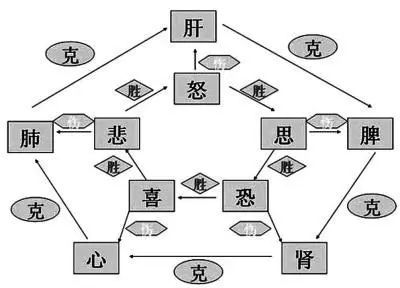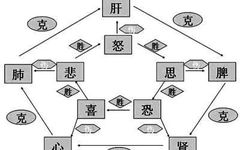 Please click above to follow us for free!
Please click above to follow us for free!

What are the ‘Seven Emotions and Six Desires’ in Traditional Chinese Medicine? In TCM, the ‘Seven Emotions’ refer to the emotional states of joy, anger, worry, thought, sadness, fear, and shock. These seven emotional states, when excessively stimulated, can lead to an imbalance of Yin and Yang, and disrupt the flow of Qi and blood, resulting in various diseases. TCM believes that these seven emotional states should be managed appropriately. If not, for example, excessive joy or sorrow, or extreme fear, can lead to an imbalance of Yin and Yang and disrupt the flow of Qi and blood, causing mental disturbances that manifest physically as various illnesses. What are the Six Desires? The concept of Six Desires was first introduced in the ‘Lüshi Chunqiu’ (Lü’s Spring and Autumn): “The so-called full life is when all six desires are satisfied appropriately.” So what exactly are the Six Desires? The Eastern Han philosopher Gao You explained: “The Six Desires are life, death, ears, eyes, mouth, and nose.” Thus, the Six Desires broadly refer to human physiological needs or desires. To survive, one fears death and seeks to live a rich and colorful life, thus needing to eat, taste, see, hear, and smell. These desires are innate and do not require teaching. Later, these were summarized as ‘seeing desire, hearing desire, fragrant desire, taste desire, touch desire, and thought desire.’ The Seven Emotions are: joy, anger, worry, thought, sadness, fear, and shock. The Six Desires are: ears, eyes, mouth, nose, body, and thought. Excessive stimulation of these seven emotional states can lead to an imbalance of Yin and Yang and disrupt the flow of Qi and blood, resulting in various diseases. TCM believes that these seven emotional states should be managed appropriately. If not, for example, excessive joy or sorrow, or extreme fear, can lead to an imbalance of Yin and Yang and disrupt the flow of Qi and blood, causing mental disturbances that manifest physically as various illnesses. The relationship between the Seven Emotions and Six Desires and the Five Organs: 1. Joy harms the Heart Joy can promote the circulation of Qi and blood, relax the muscles, and aid in recovering from fatigue. However, excessive joy can damage the Qi of the Heart. As stated in the ‘Huainanzi: On the Way’: “Excessive joy leads to negligence.” Excessive Yang can cause the Qi of the Heart to move, leading to scattered spirit and extreme evil Qi, resulting in palpitations, insomnia, forgetfulness, and even dementia. The story of Fan Jin, who became mad due to a mix of joy and sorrow in ‘The Scholars’, is a typical case of joy harming the Heart. 2. Anger harms the Liver Anger is a common emotion; it causes Qi to rise, harming the Liver, leading to feelings of gloom, irritability, dizziness, and is also a significant cause of hypertension, coronary heart disease, and gastric ulcers. 3. Worry harms the Lungs Worry is closely related to the Lungs; extreme worry can harm the Lungs, leading to dry cough, shortness of breath, hemoptysis, hoarseness, and changes in breathing rate. Lin Daiyu from ‘Dream of the Red Chamber’, who is sentimental and melancholic, is a good example of this. 4. Thought harms the Spleen TCM believes: “Thinking leads to Qi stagnation.” Excessive thinking can disrupt the function of the nervous system and reduce the secretion of digestive fluids, leading to loss of appetite, dullness, emaciation, shortness of breath, fatigue, and depression. 5. Sadness is the emotion of the Lungs In TCM, sadness and worry are both associated with the Lungs. Sadness is the extreme of worry. Excessive sadness often depletes Lung Qi, affecting the Heart, Liver, and Spleen. For example, depleting Lung Qi can lead to weak Qi, low spirits, and feelings of hopelessness, manifesting as shortness of breath, chest tightness, and fatigue. If it affects the Liver, it can lead to mental confusion, and even muscle spasms and discomfort in the ribs. Excessive sadness can also injure the Heart Qi, leading to palpitations and confusion. If it affects the Spleen, it can cause stagnation of Stomach Qi, leading to abdominal distension and muscle atrophy. In the Five Elements theory, the Lungs belong to Metal, and Fire overcomes Metal; thus, sadness harms the Lungs, while joy overcomes sadness. Moderate joy can counteract the diseases caused by excessive sadness. 6. Fear harms the Kidneys Fear can disrupt the nervous system, leading to tinnitus, deafness, dizziness, impotence, and can even be fatal. The saying “scared to death” reflects this principle. In life, the changes in emotions such as joy, anger, sorrow, and happiness are intertwined with our daily experiences. One should remain calm and composed when facing complex situations. After events, do not dwell on them for long, causing self-inflicted distress. Fostering an optimistic attitude, enhancing psychological resilience, and maintaining a broad mind are essential. Emotions should be optimistic, and one should cultivate tranquility and contentment, viewing life’s joys and sorrows, honors and disgraces, labors and gains as fleeting. Seek peace of mind in all matters, maintain inner tranquility, and one can achieve longevity. 7. Shock Shock refers to the emotional experience of tension and fear caused by unexpected events. The key to shock is the suddenness of the unexpected event. Shock often arises from external stimuli but can accompany other emotional experiences, creating a complex emotional state. For example, shock can arise from unexpected good news, near-miss dangers, or unforeseen calamities. Fear and shock differ; shock is primarily characterized by fear and anxiety, often accompanied by attempts to escape, while shock can also be accompanied by joy or fear. Emotional disturbances caused by the Seven Emotions can harm the internal organs, primarily affecting the Qi dynamics of the organs, leading to abnormal ascension and descent of Qi, and chaotic blood circulation. Different emotional stimuli have varying impacts on Qi dynamics. The patterns of how the Seven Emotions affect the Qi dynamics of the organs are summarized in the ‘Suwen’: “Anger causes Qi to rise, joy causes Qi to relax, sadness causes Qi to dissipate, fear causes Qi to descend… shock causes Qi to become chaotic… thought causes Qi to stagnate.” Anger causing Qi to rise means that excessive anger can cause Liver Qi to rebel upwards, leading to blood following the rebellious Qi, resulting in clinical manifestations such as Qi rebellion, flushed face, or even vomiting blood, and in severe cases, fainting. Joy causing Qi to relax includes both alleviating tension and dispersing Heart Qi. Under normal circumstances, joy can ease tension, allowing the Ying and Wei Qi to flow smoothly, leading to a pleasant mood. The ‘Suwen’ states: “Joy causes Qi to harmonize and the will to be fulfilled, thus Qi relaxes.” However, excessive joy can also scatter Heart Qi, leading to an inability to concentrate, and in severe cases, mental disarray. Sadness causing Qi to dissipate means that excessive sadness can lead to depressed Lung Qi, low spirits, and depletion of Lung Qi. Fear causing Qi to descend means that excessive fear can lead to unstable Kidney Qi, causing Qi to leak downwards, clinically manifesting as incontinence; or unresolved fear can harm essence, leading to bone pain, weakness, and nocturnal emissions. Shock causing Qi to become chaotic means that sudden shock can leave the heart unanchored, the spirit ungrounded, and the mind unsettled, leading to panic. Thought causing Qi to stagnate means that excessive thinking can harm the spirit and the Spleen, leading to Qi stagnation. The ancients believed that thought originates in the Spleen and is completed in the Heart; thus, excessive thinking not only depletes the spirit but also affects Spleen Qi. Excessive thinking can harm both the Heart and Spleen, depleting Yin blood, leading to palpitations, forgetfulness, insomnia, and vivid dreams; Qi stagnation can obstruct the Spleen’s function, leading to poor digestion and abdominal distension. The Seven Emotions represent TCM’s understanding of basic human emotions. Beyond the Seven Emotions, love and hate, pride and shyness, dignity and contempt are also fundamental emotional expressions of humanity.
Copyright Statement: We emphasize sharing; articles and images are sourced from the internet, and copyright belongs to the original authors.
Every little effort counts!
‘The Medical Chronicles of Xiao Langzhong’ – A TCM Story of Grandfather and Grandson..
Recommended public accounts to follow.
FollowQihuang Medical Society for disease search

Rheumatism, bone hyperplasia, low back pain, joints, shoulder periarthritis, cervical spondylosis, kidney tonification, liver nourishment,
weight loss, gynecological diseases, menstrual irregularities, cold uterus, acne, constipation, insomnia, rhinitis,
heart disease, diabetes, high blood sugar, hypertension, slim legs, white hair, hair loss,
oral ulcers, snoring, cramps, colds, coughs, sore throat, dampness

